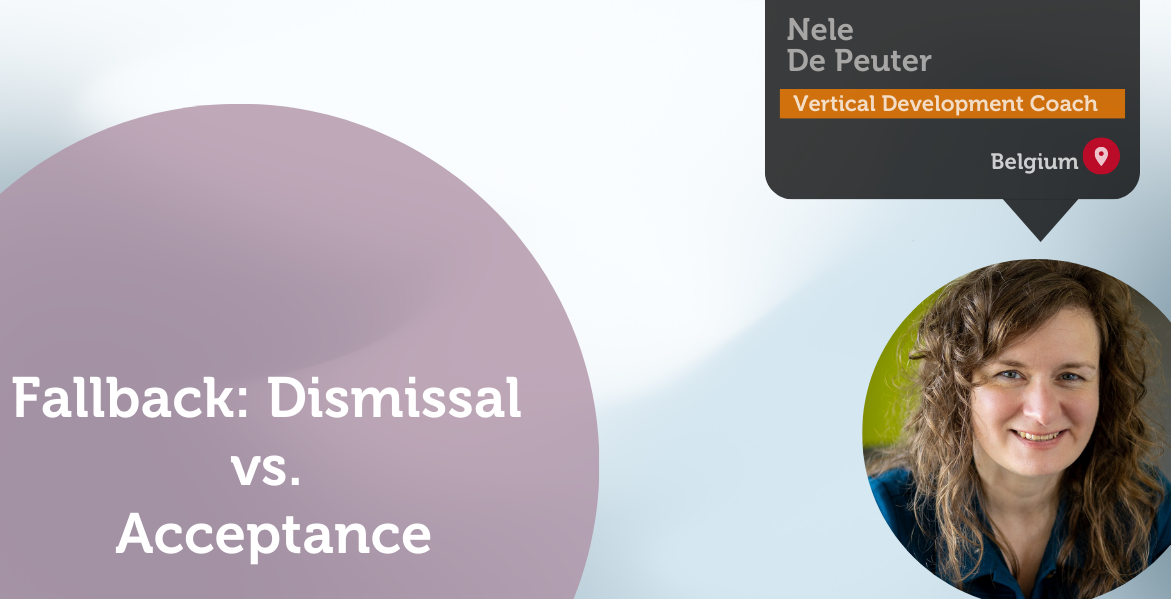A Coaching Power Tool By Nele De Peuter, Vertical Development Coach, BELGIUM


Fallback: Dismissal vs. Acceptance Definition
Fallback: Dismissal
We’ve all experienced those moments when things aren’t going quite as planned. It’s like walking on eggshells, just waiting for something to set you off. And even though you can feel it building up inside, sometimes you can’t help but let it out – whether that means shouting, crying or even acting cold and unfriendly. In short, not at all the way you want to be or the way you want to be seen.
Once the storm has passed, we may experience a range of emotions such as sadness, self-anger, and/or shame.
Many times, we have the inclination to ignore, dismiss, or even try to erase these emotions and experiences. We tend to do this because we believe it doesn’t align with who we are as individuals – almost like a temporary malfunction.
However, it’s crucial to remember that these feelings are temporary and shouldn’t define our outlook. It is essential to look beyond these negative emotions, even if we feel completely disoriented or lost.
This power tool gives coachees the chance to explore why falling back can actually be an opportunity rather than something negative. Understanding the reasons behind fallback will not only help to appreciate it but also uncover the valuable lessons it has to offer.
Fallback: Dismissal vs. Acceptance: What Is Fallback?
Fallback is the loss of options, of capacity, of the ability to feel, behave, and think at the emotional and psychological level that we are ‘normally’ (optimally) capable. We are human and as such we are incredibly complex and imperfect.
The definition mentioned here has been formulated by Valerie Livesay in her book titled “Leaving the Ghost Light Burning.” The perspective or framework employed in this definition is that of adult development theory.
The field of adult development essentially describes how adults develop more comprehensive and complex ways of making sense of themselves and their experiences. Theorists have identified patterns of meaning-making that human beings share in common which are referred to as stages or levels of development. Developmental movement from one stage to the next is often driven by a felt sense of limitations in the current way of constructing meaning and making sense of everyday life.
Mostly we seem to live at our developmental center of gravity, our default, go-to place. However, we can also operate at a later stage when we feel our best selves and sometimes we fall back, e.g. when we feel ill or when we feel stressed.
There is a tendency in the field to mainly look at growth, in moving to later stages. Fallback seems to be ignored in some way. However, there is so much value in looking at fallback.
Many people tend to view life and organizations in a linear manner, believing that more is always better and reaching later stages is a sign of improvement, of becoming a better person. However, this mindset can sometimes be limiting. True growth comes from building upon our existing strengths and experiences, rather than just striving for advancement to the next stage.
Think of it like a house. You begin with the foundation, and then you gradually add new floors. It’s not like you’re constructing an entirely new house because the existing one is worn out; instead, you’re simply expanding and improving upon what you already have. Yes, it’s important to acknowledge and appreciate the abilities and experiences we have gained in previous stages of our journey. Sometimes, we tend to overlook the earlier stages as we progress, but it is crucial to remember that personal growth is a continuous process. The concept of a “transcend and include” model suggests that we build upon our past selves while embracing new developments. Thus, there is equal value in recognizing and valuing all parts of ourselves, including our earlier stages.
Fallback: Acceptance
Fallback refers to the phenomenon where individuals unintentionally revert back to an earlier stage of development in their ability to make meaning. This means that they temporarily lose the capacity to think, feel, or behave differently and rely solely on previous ways of understanding and engaging with the world. The complete loss of options, of the capacity of access to feel, to behave, to think at the developmental level at which you are ideally capable.
We often dismiss the way we show up in Fallback, this aspect of self that is smaller than we like to see ourselves, than we like to be seen as. What happens is that we need to protect something that is important to us, that we value, that feels at risk, but we very rarely experience or articulate it as such.
By rejecting our fallback – the thoughts, behaviors, and experiences we default to – we limit our ability to engage in meaningful exploration. It is through this exploration that we can discover what it is we truly value and that we are protecting in our fallback. Our task is to figure out what it is and understand our underlying motivations. This way, we will be better equipped to recover and we will get to know ourselves better. This self-awareness opens up new avenues and potential opportunities for what lies ahead.
Embarking on the journey of personal growth and self-discovery can sometimes involve challenges and difficulties. It is natural to experience pain and loss along the way as you strive to uncover the true depths of your identity. However, embracing this process is essential for reaching your fullest potential and embracing all aspects of who you are. This exploration allows us to recognize the gifts that can only be received from a place of surrender into those earlier but still very present and important aspects of self.
By embracing the idea that we are constantly evolving, we gain a deeper understanding and empathy towards others who are on their own journey of personal growth. Recognizing that we are all in the process of becoming allows us to let go of societal expectations and definitions imposed on us, and instead cultivate a sense of self that is true to who we truly are. We are able to see the possibilities that lie in embracing the full and fluid complexity of showing up in this world as humans and allowing others to do so as well.
Noticing
Curiosity is key in this process of uncovering what the value is of our fallback.
Fallback can manifest itself in various ways, displaying behavior that is noticeably different from one’s usual demeanor. The range of manifestations is quite extensive, ranging from outbursts of anger and shouting to adopting a pleasant and compliant attitude to fit in with societal norms and seek approval from others.
Yet, because we are humans, we have the ability to grow and change and be mindful and intentional about how this happens. We can cultivate the capacity to notice when we are not showing up as our best selves. We can be willing to be honest with ourselves about what’s going on.
When we fall back, we are unconsciously acting, feeling, and making meaning from a developmental space that is earlier than that to which we generally have access, e.g. regression into childhood patterns. For that moment or space of time, we have lost access to the choices we have available when at our full capacity. Yet when we can name the behaviors that manifest in our fallback, when we can identify what is lost in those moments, we are more apt to notice.
It is in noticing that we come into a more honest, authentic relationship with the many versions of us that come into the scenes of our lives in the course of a day. We are building the muscle of awareness through practice.
Still, the ego is powerful, it has many tricks for protecting itself and it’s had a lifetime to cultivate this capacity. So this requires patience, hanging in there even though it feels bad until you are able to discover what feels threatened in those moments, what is being protected. Try to get glimpses of the tethers pulling you back to an earlier part of self and observe the loss of capacity of other ways to see or act.
When you identify what truly matters to you, it enables you to develop a more deliberate and productive manner of moving into the world. This self-awareness empowers you to take proactive steps towards protecting and nurturing those values in a purposeful manner.
Beginning to notice the times when we show up with less than our optimal developmental capacities is the first step in coming to a different relationship with our fallback. Recognizing oneself in a fallback situation is a significant step. It means that while you may still feel immersed in the situation, there is also a part of you observing and reflecting on it. This awareness may come either in the moment or perhaps only afterward.
Reflecting on Our Fallback
Engaging in reflection to understand our fallback leads to the ability to use it and work with it differently. This is how development happens.
By consciously reflecting on our moments of fallback, we can cultivate a heightened sense of self-awareness. This practice allows us to examine our actions, thoughts, and emotions during those moments, even if we may not be able to change them in the heat of the moment. As our fallback is unfolding, we have the opportunity to discover and embrace our true selves in all its richness and completeness.
Paradoxically while fallback is developmental decline in the moment, it can lead to growth when we shift our relationship to it.
The implications of undertaking this process of discovery and growth are many, not the least of which is the opportunity it offers us to acknowledge the full range of who we are as humans. It’s about inviting and welcoming all parts of the self, also the ones that are shadowy and dark, there is good within them.
It’s not about getting to know these parts so we can get rid of them once and for all. You will never be rid of this piece of self. And you don’t want to be, they are integral characters of the story of your life and they have something important to teach you. It is crucial to actively listen and learn from them, rather than trying to discard or ignore them altogether. By listening you will come to understand what this part of you is protecting in you, what it is that feels threatened. You will have the opportunity to befriend them, to understand them, to form a different relationship with this part of you that you have attempted to keep hidden from yourself and from others.
These parts of self are your old friends, they were great friends at one point in your life. You have made new friends now, the goal is to integrate this group of old and new friends.
As we develop into greater complexity, we have access to more options and different perspectives on what’s both inside and external to us. However, this development is not linear. We go up and down the spectrum of developmental capacity, and sometimes we just don’t have access to our fullest level of sense-making.
Change lies in the acceptance of what is.
References
Bluckert, P.. (2019). A Comprehensive Guide to Vertical Development. Peter Bluckert.
Livesay, V. (2022). Leaving the Ghost Light Burning: Illuminating Fallback in Embrace of the Fullness of You. Amazon Digital Services LLC – Kdp.